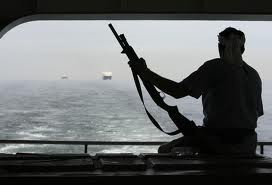
November 2012
Although there has been a recent drop in the number of pirate incidents in the waters off the east coast of Africa, many in the international shipping industry are warning that this does not mean the epidemic is over.
Many realize that containing the symptoms of the issue is no substitute for a permanent solution. However, there isn’t a consensus on exactly what that permanent solution is, or how to implement one that can be agreed upon. The success so far has been achieved largely due to increased international naval presence in the Indian Ocean. The increased hiring of armed guards aboard merchant vessels has also played a significant role.
While these have addressed the immediate issues, there are legitimate questions about the long-term viability of such solutions. For one, as defense budgets shrink worldwide, it will not be possible to station a permanent detachment of international forces in this heavily transited body of water. Even if state-spending wasn’t being reduced, many argue that the amount of money it costs nations to station such expensive vessels in the ocean doesn’t even come close to the amount of money that they’re saving oil companies. This argument is driven further by the point that the oil companies themselves should be spending money on security, not national governments. This leads many to think that the future of maritime security lies in the hands of privately hired security contractors that operate aboard individual vessels.
However, questions remain around this burgeoning new industry, threatening to damage its effectiveness even before it gets fully off the ground. Private security forms have a debatable, at best reputation worldwide, and on the ocean, regulation remains as cloudy as ever. There are no defined international regulations for this industry, and maritime laws that vary depending on country have prevented many of these companies from operating as they would like.
For instance, many ports ban any kind of weapons from being brought in on commercial ships, creating a logistical problem for armed guards. Some firms stash their weapons at floating armories in the ocean, but this itself has raised numerous concerns. Other stash them on land, but these armories too are looked at with great skepticism as well.
Furthermore, there have been reports of armed guards indiscriminately firing upon other merchant vessels, mistaking them for pirates. Interestingly, there has yet to be such an accusation against a private security firm, but soldiers from numerous navies have gotten themselves and their countries into quite a bit of trouble for these kind of acts.
Of course, there is a consensus on the ultimate solution: Until the central government of Somalia is stabilized, the country will not be able to fix the internal and external problems that cause piracy. The lack of a Somali coast guard in the first place caused these bands of pirates to form, first to defend their own waters, and then to attack foreign vessels. And currently, because of the state of the Somali economy, many men are driven to piracy because they have no other option. If the fishing industry was fixed and the economy stabilized, there would be less pirates to even need to secure ships from.
Until that time, however, the world will need to make a decision: Will we continue spending national defense dollars to securing the ocean, or will a body of nations step up to solidify regulation on private military contractors at sea?